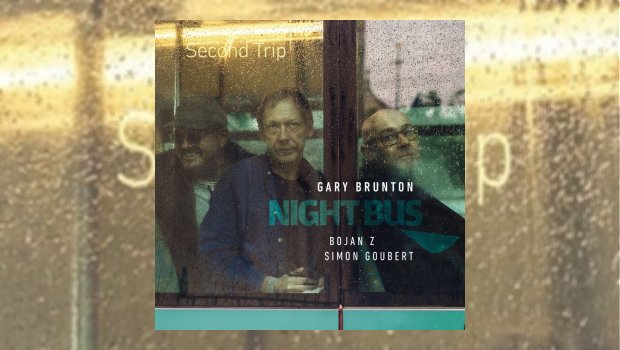Sometimes, jazz is just the tonic you need.
We don’t often dip our toes into the purer end of this particular ocean of possibilities, but there’s no reason why we can’t, so here goes.
Jazz always works best in a live setting for me, to experience the players sparking off each other and inspiring unexpected diversions, and the this second Night Bus album sees producers François Jeanneau and Gary Brunton achieve a startlingly vivid live feel, particularly in the thumpingly vibrant drum sound.
Meeting in Paris in 1988, bassist Brunton and pianist Bojan Zulfikarpasic (‘Z’ is a lot more efficient) hung out whilst learning their jazz craft, eventually getting to know Simon Goubert, who may be familiar to readers of these pages for his work with Christian Vander in Offering and later Magma, most recently contributing piano to 2019’s Zëss album. Here he shows his other side, battering his drumkit with gleeful abandon. It has taken 30 years of separate career arcs for the stars to align and allow the long-time friends to work together. The Night Bus project, named for Gary and Bojan’s late-night journeys home as students, sees the decades of experience and diligent experimentation shine through, the debut album receiving excellent reviews and getting a spot in Down Beat‘s albums of 2020.
Gary’s ‘day job’ is his Pee Bee big band, TPA reviewed their Or Not To Be album early last year. Like that release, this newly minted second Night Bus album shows rock influences amid Gary’s original compositions, and a glance at the track listing will note a couple of David Bowie covers. In many ways, this is jazz for people who think they don’t like that sort of thing, taking the traditional stylistic individuality and history of the musicians and mixing in swing, rocking grooves, dance-influenced rhythms and structured improvisation to create a compelling listen that showcases the trio’s captivating and spontaneous interplay. It’s a joyous listen.
François Jeanneau’s nurturing presence encouraged the trio to push their arrangements forward, and there’s an eagerness in the playing as they feed off each other’s work, with often startling results. From the tinkling piano intro of Blackpool Girl (a more exciting and exotic ‘Pool than the one I know; there must be another, nearer the equator where the tide doesn’t go out as far), rolling drums rise as the atmospheric opening reaches a crescendo. Double bass picks up the tempo and we’re off. The first thing to pick up on is, as already noted, the extraordinary vibrancy of Simon’s drums, huge and resonant, driving along below Bojan’s dancing piano. It’s dextrous and engaging, sucking the listener into the players’ world. It’s this ‘in the moment’ feel that the album truly captures. It’s ‘in your face’ when it needs to be, subtle and delicate in other moments, long experience coming together, as if in the place where these skills were learned – the live setting.
There’s a playful edge to Polka’s Playtime (appropriately named for Gary’s new kitten) and we’re back in a world of ’60s post-bop, Bojan taking the lead with pounding drum support in a finger-snapping groove, all three soloing fluently. The propulsive rhythms continue through Korean Influence before a solo segment for Gary, showing his undying loyalty to his home-town Burnley FC in the somewhat melancholic Once a Claret (it’s not easy being a footie fan…) and a delicious take on Bowie’s Ashes to Ashes.
Two Wrongs Don’t Make a Right is a bright and airy showcase for Bojan’s delicate touch, with some sparkling minimalist interplay and lyrical bass as the others gradually become more involved. The spirit of Charles Mingus filters through the late-night ease of dusky piano and sparse brushed drums in Mingus’ House, picking up the tempo and playing with the possibilities in the album’s longest track, before returning to where it started.
The second Bowie cover is a thumping take on Moonage Daydream, ominous chording settling into a strident blues, the rolling outro setting up the bright and appropriately titled Retrouvailles (‘Reunion’) where the compelling central theme dances on a beautiful upbeat vibe of skittering drums. Bookending the slow, bluesy sway of Behind The Bowler’s Arm (the ideal spot to watch cricket on a languid afternoon) are a brace of duets; twangy bass walking over a strutting drum shuffle in homage to bass legend Red Mitchell, and a piano and bass take on the familiar tones of the only standard in the set, Irving Berlin’s How Deep is the Ocean, twisted and massaged in pleasingly unexpected directions. Finally, the trio come together for a powerful Havana Brown to bring the album to a satisfying conclusion.
This is a compelling listen, fun and engaging, confidence matched by abilities, and it makes me look forward to being able to see small groups play their hearts out in sweaty rooms again. There’s a relaxing flow, even during the more intense passages, and it’s the organic qualities that shine through; three guys, acoustic instruments and a love for what they are able to achieve together. Highly recommended for late night with a glass of something equally intoxicating.
TRACK LISTING
01. Blackpool Girl (5:27)
02. Polka’s Playtime (4:39)
03. Korean Influence (3:05)
04. Once a Claret (0:51)
05. Ashes to Ashes (2:40)
06. Two Wrongs Don’t Make a Right (4:49)
07. Mingus’ House (6:31)
08. Moonage Daydream (5:32)
09. Retrouvailles (2:21)
10. Red Mitchell (3:08)
11. Behind The Bowler’s Arm (4:23)
12. How Deep Is The Ocean (4:54)
13. Havana Brown (5:16)
Total time – 53:36
MUSICIANS
Gary Brunton – Double Bass, Composition
Bojan Z – Piano
Simon Goubert – Drums
ADDITIONAL INFO
Record Label: Juste Une Trace
Country of Origin: France
Date of Release: 30th April 2021

